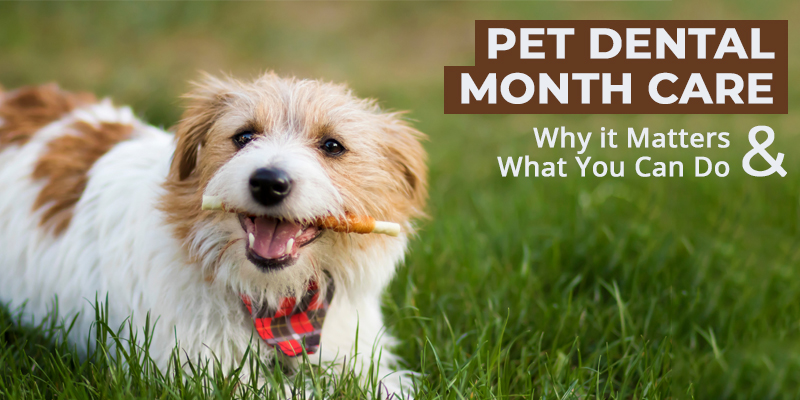
Dogs frequently suffer from dental conditions. More than 80% of dogs have dental disease, also known as periodontal disease, by the age of three. Since the canine dental disease can have grave consequences, maintaining adequate dog dental care is essential.
In this blog, we’ve noted the rationale for the significance of a pet’s dental health in light of the upcoming National Pet Dental Health Month. Read on to learn more about the importance of a pet’s oral hygiene!
What Causes Dental Illness in Pets?
The teeth, gums, and tissues that support and surround a dog’s teeth are all impacted by dental disease. The initial step is the accumulation of dental plaque. This plaque contains leftover food and microorganisms.
Tartar forms when plaque on the teeth persists. During a thorough dental cleaning, your veterinarian can easily remove tartar that has built up above the gum line because it is so obvious.
However, appearances can be deceptive. The health of your dog’s mouth is not necessarily indicated by the appearance of pearly whites. Tartar that accumulates below the gum line is the true problem.
Tartar below the gum line not only damages the tooth-supporting structures and irritates the gums, but it also spreads infection. When tooth illness reaches this stage, dogs may have severe dental difficulties and sufferings.
Symptoms of Canine Dental Diseases
- Dental damage
- Loosened teeth
- Foul breath
- Bleeding and Painful Mouth
- Food or drink refusals
- Drooling
Why Dental Care Is Vital for Dogs
It goes without a doubt that every pet parent wants their pooch to have a healthy mouth. Check these five explanations for why your dog’s general health depends so much on proper dental care:
- Dental care for avoiding teeth loss: The teeth of a dog become loose and fall out when the structures supporting the teeth are harmed or contaminated. With the right canine dental care, those teeth-supporting structures will continue to function normally and keep the teeth in place.
- Keeping foul breath at bay (halitosis): It’s time for some good dental care if your nose hairs curl when you smell your dog’s breath. If your dog has good dental health and maintains oral hygiene, bad breath won’t be an issue.
- Preventing mouth discomfort: For dogs, dental illness, particularly when it is severe, can be quite painful. By keeping your dog’s teeth and gums healthy, you can prevent dental pain.
Also read: Dental Problems and Maintenance of Oral Hygiene in Dogs
Ways to Keep Your Dog’s Teeth Clean
- Brush your dog’s teeth regularly: It’s a fantastic idea to brush your dog’s teeth a few times a week to keep their oral health in check. Consider using veterinary-strength enzymatic dog toothpaste, which is safe for dogs.
- Provide dental dog treats: Not all dogs enjoy having their teeth brushed. Try giving your dog some dental treats if this is the case. This will keep your dog entertained and help improve their dental health.
- Offer some dog chew toys: Some dog dental chew toys are made to help dogs with their oral hygiene and even breathing freshening. Choose dog-safe sturdy dental toys that can be chewed longer and make your pup’s playtime enjoyable and beneficial for their dental health.
Bottom line:
By giving your pet the appropriate dental care, you can keep them happy and healthy. As a pet parent, you can brush your pup’s teeth at home, but you should also go to the veterinarian for a thorough checkup and cleaning. General anesthesia is necessary for professional canine dental cleanings so that your veterinarian may thoroughly clean your dog’s mouth and all surfaces above and below the gum line. Therefore, talk to your veterinarian about the finest options and a strategy for your dog’s regular dental care.
Although the canine dental illness is widespread, a dog’s mouth can remain as healthy as possible with the right dental care.






